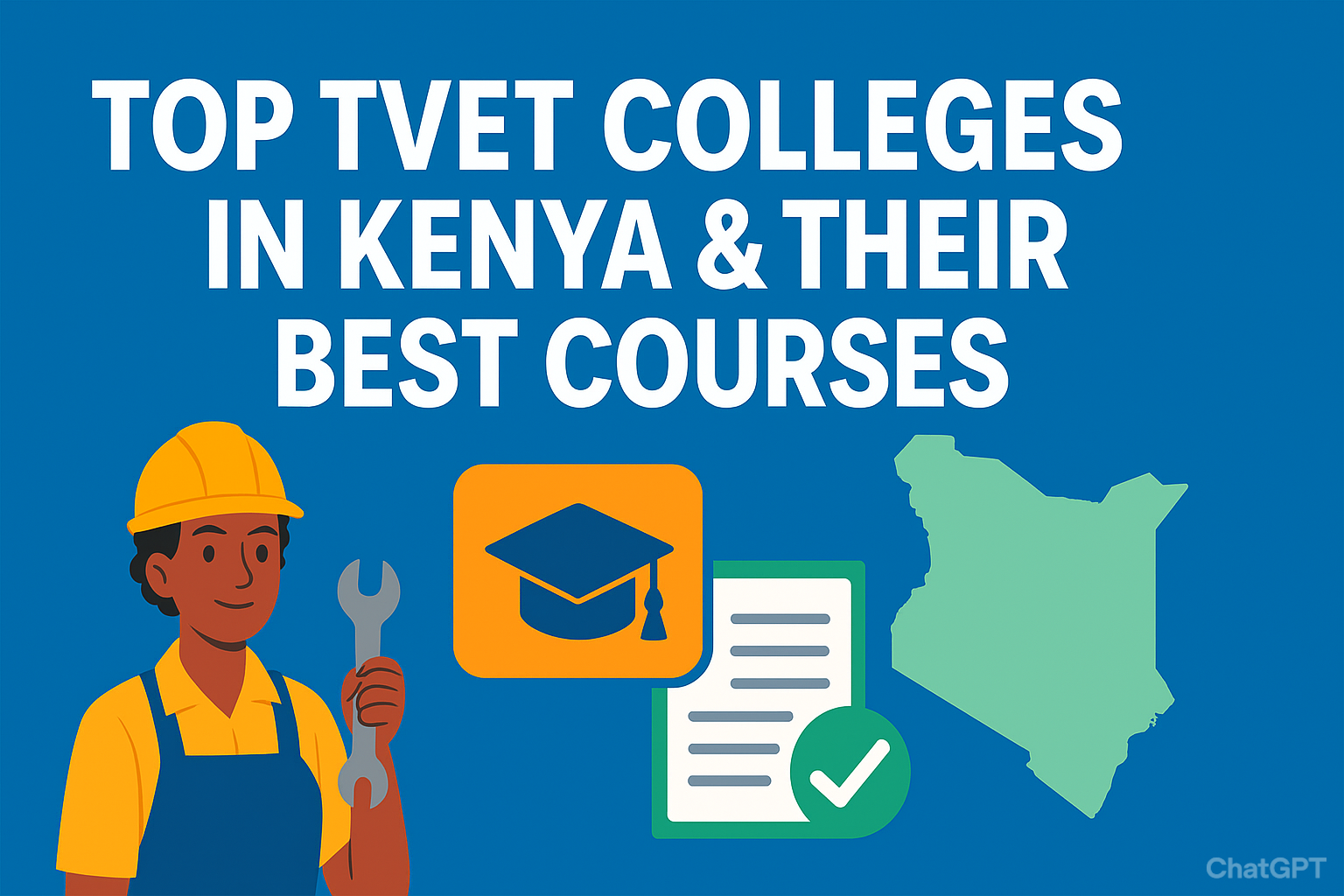

Titus Morebu
Author
Top TVET Colleges in Kenya & Their Best Courses You Should Know
Discover the leading accredited TVET colleges across Kenya, explore in-demand courses for 2025, and learn how to choose the right institution for skills & career growth.
Technical and Vocational Education and Training (TVET) plays a pivotal role in Kenya’s education sector by producing hands-on, employable graduates who can respond to the evolving demands of our economy. Whether you're finishing secondary school, changing career paths, or seeking practical training, knowing the best TVET colleges and courses will help you make a well-informed decision. ✅
What is TVET & Why It Matters in Kenya
TVET refers to training programs that equip individuals with specific trades, crafts, or technologies. These may include certificate, diploma, or artisan programs. The Kenyan government, through TVETA (TVET Authority), accredits institutions to ensure quality, relevance, and recognition. TVET is crucial because:
- Employability: Students gain skills that are directly needed in sectors like construction, hospitality, agriculture, ICT, health, and manufacturing.
- Start-ups & informal economy: Many TVET grads become entrepreneurs, providing services in local communities.
- National development: Kenya’s Vision 2030 and other strategy plans emphasize industrialization & technical capacity.
How to Choose a Good TVET College
Here are key criteria to compare colleges: 🧐
- Accreditation: Ensure the college is registered & licensed by TVETA.
- Available Courses & Levels: Certificate, Diploma, Artisan, Craft, etc., in your area of interest.
- Facilities & Equipment: Workshops, labs, modern tools matter.
- Staff & Instructor Experience: Skilled, certified trainers who keep up with industry standards.
- Employability & Linkages: Do they have partnerships with employers or apprenticeship opportunities?
- Location & Accessibility: Cost of travel, boarding, rural vs. urban setting.
- Cost of Training: Tuition, materials, tools etc.
What Courses are in High Demand in 2025
Recent trends show certain TVET courses are more marketable than others. Some of these include:
- Information & Communication Technology (ICT): Software engineering, network administration, cybersecurity, AI & data analytics.
- Electrical & Electronics: Installation, renewable energy, solar power systems, automation.
- Fabrication, Welding & Metal Works: Particularly with rising infrastructure & industrialization.
- Automotive & Motor Vehicle Mechanics.
- Building & Construction Technology: Carpentry, masonry, plumbing.
- Hospitality, Catering, Tourism & Food Technology.
- Agriculture & Agri-business: Modern farming, irrigation, animal husbandry.
- Fashion Design, Garment Making, Beauty & Cosmetology.
Top TVET Colleges & Polytechnics Across Kenya
Here are some of the most reputable TVET colleges / institutions in Kenya, along with examples of courses they offer. These are accredited and recognized under TVETA or relevant government oversight.
Kenya Coast National Polytechnic (Mombasa)
One of the oldest polytechnics, offering modern hands-on training in technical fields. Courses include Civil Engineering, Mechanical Engineering, Electrical & Electronics, ICT, Hospitality & Tourism, Applied Sciences.
Sigalagala National Polytechnic
Located in Kakamega County. Known for strong trades programs: Building & Construction, Carpentry & Joinery, Automotive Engineering, Welding Fabrication, Electrical Wiring & Maintenance.
Kisumu National Polytechnic
Offers courses in ICT, Business Studies, Fashion & Design, Beauty Therapy, Mechanical Engineering and more, serving Western Kenya.
Rift Valley Technical Training Institute (RVTTI)
Based in Eldoret; strong in Agri-business, Electrical & Mechanical Trades, IT, Building Technology, and industrial attachment opportunities.
Nairobi Technical Training Institute (NTTI)
Urban setting with many specializations: Information Technology, Industrial Electronics, Plumbing, Construction Engineering, Hospitality & Catering.
Jomo Kenyatta University of Agriculture and Technology – TVET Institute (JKUAT TI)
University-based TVET offering high-level diplomas, certificate programs and research linkage, particularly in agriculture, renewable energy, engineering, and applied computing.
Kabete National Polytechnic
Located in Nairobi, strong pedigree in Engineering, ICT, Business, Environmental Health, Fashion and Beauty. Offers both certificate and diploma levels.
Gusii Institute of Technology / Gusii IT (Kisii County)
Good for technical trades, automotive, agricultural processing, business and ICT fields, particularly for those in the Rift Valley / Western region.
Mombasa Technical Training Institute (Now part of Kenya Coast National Polytechnic)
Offers traditional technical training, maritime-related courses, hospitality, tourism, fashion, etc.
Sample Courses You Can Do by Level & Entry Requirements
| Level | Typical Entry Requirement | Example Courses |
|---|---|---|
| Certificate / Artisan / Craft | KCSE D-, or lower; sometimes D+ / Grade equivalent; or prior relevant work | Welding & Fabrication; Plumbing; Tailoring & Dressmaking; Electrical Installation; Agri-Business; Catering & Food Production |
| Diploma | KCSE C- / C / or certificate in relevant field | ICT / Computer Science; Mechanical Engineering; Electrical & Electronics; Hospitality Management; Agricultural Engineering; Fashion Design |
| Higher Diploma / University-TVET Level | KCSE C+ / Diploma; possible bridging requirements | Renewable Energy Engineering; Industrial Automation; Advanced ICT / Cybersecurity; Project Management; Applied Health Sciences |
Accredited TVET Institutions You Should Consider
TVET Authority (TVETA) maintains a list of registered & licensed technical & vocational institutions. When selecting a college, verify its status. A few examples include:
- Equip Africa Institute – Malindi Centre
- Alika Medical Training College (Kiambu)
- Don Bosco Boys Technical Training Centre (Nairobi)
- Mosoriot Technical and Vocational Training Institute (Nandi)
- Kipsigis Institute of Vocational Training College (Kericho)
Tips to Succeed in TVET & Maximize Its Benefits
To get the most from your TVET journey:
- Do internships, attachments, or apprenticeships: Real-world exposure helps build skills, resumes, and often leads to job offers.
- Stay updated with technology: For example, digital tools in design, automation in engineering, renewable tech in electrical, etc.
- Network with peers & instructors: Opportunities often come via recommendations or project collaborations.
- Consider combining courses: Mix technical skills with business, communication or digital skills to broaden employability.
- Budget wisely: Factor in fees, tools, materials, transport, accommodation where needed.
Future Trends Shaping TVET in Kenya
As Kenya moves forward, these trends are likely to influence what colleges offer and what students should prepare for:
- Growing demand for renewable energy & green technologies.
- Automation, robotics, AI & digitalization in manufacturing / services.
- Expansion of remote / distance blended learning (for theory components).
- Stronger industry-college partnerships, apprenticeship models.
- Emphasis on soft skills: communication, critical thinking, teamwork.
Conclusion
Choosing the right TVET college and course in Kenya can be a life-changing decision. Look for accreditation, practical training, in-demand skills, and institutions with good linkages to employment. With the right fit, TVET can lead to stable jobs, entrepreneurship, and meaningful contribution to Kenya’s socio-economic growth. Your skills matter – pick wisely and train smart! 🎯
Want to explore more? Visit the official TVET Authority site to see list of accredited TVET institutions. To see all registered courses and levels, check TVETA’s catalogue of TVET courses in Kenya.
Gallery

Related Articles
3 articles
How to Apply for a Canadian Student Visa from Kenya in 2025 🍁
Learn the complete, up-to-date process, requirements and tips for Kenyans applying for a Canadian study permit in 2025. Stay ahead with changes and best practices.

Best Free Learning Apps for Kenyan Students in 2025
Discover powerful free learning apps for Kenyan students — from curriculum-aligned platforms to global resources that work offline and on low-data connections.

How to Land an Internship in Kenya: A Step-by-Step Guide to Success 🚀
Discover the most effective strategies to secure internships in Kenya—eligibility, applications, channels, preparation, visa tips—and stand out in 2025.